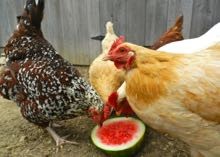Yesterday, as I was harvesting veggies for dinner, I cut the tough tops off of a few leeks and tossed them into the chicken run. The girls also got the old bean stalks, carrot greens and a few insect-chewed kale leaves. The hens clucked and chuckled at this manna from what appeared to be heaven – being as how I was literally throwing it over the fence and into their yard, it must have appeared to them as gifts from the gods.
Awhile later, after prepping my own dinner in the kitchen, I came out with a few more veggie scraps for the girls and the compost. Walking through their pen, I noticed that Petunia had a long leek leaf hanging from her mouth. Really long, about ten inches. She was trying to swallow it, and was taking it in like a worm. Of course, a chicken can’t spit something out. Once she started, she had to finish. Petunia had a distressed look in her eyes. Eating a tough long leek in this way must be uncomfortable! Not to mention a choking hazard. So I pulled and pulled and out it came. It was at least sixteen inches. Poor Petunia was vastly relieved to be done with that leek.
Is there a lesson in this story? Perhaps “don’t feed hens anything that looks remotely like a worm.” Or, ‘chop up long, stringy things before tossing them to the girls.” Or, “keep an eye on your hens; you never know what sort of trouble they can get into.” Or, “if you’re going to keep chickens, you can’t get grossed out at things like pulling a leek out of a gullet.”
